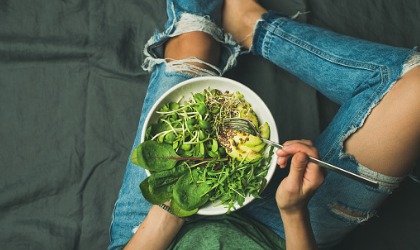
Though your plant-based, vegan diet may be overflowing with colour, delicious wholefoods, and unrefined goodness, it’s also likely to have a shortage of important nutrients. Even with carefully planned meals and snacks, it can still be pretty challenging to receive the full spectrum of nutrients on a plant-forward eating pattern. Some critically important nutrients can be very low – vitamin B12, for instance – which is essential for cognition, mood, and energy production. with this in mind, it can be helpful to supplement your diet to cover any nutritional shortfalls and support your overall wellbeing.
Vitamin B12
Traditionally found in animal sources, getting enough vitamin B12 is essential for plant enthusiasts. This nutrient supports a range of bodily functions, including the formation of oxygen-transporting red blood cells, protein metabolism, and supporting the overall health of the nervous system. Without an adequate supply, you may experience weakness, fatigue, and slew of other problems. In addition to eating foods fortified with vitamin B12 – plant-based milk, nutritional yeast, and some cereal – adding a high-strength supplement to your diet is the only reliable way to achieve the recommended daily allowance of 1.5 micrograms (µg).
Iron
Not only a building block for DNA and red blood cells, but also essential for transporting oxygen throughout the body and energy production, iron is a key ingredient to your overall health and happiness. Too little, and you’ll find yourself exhausted, sluggish, and weak. You may even experience chest pain, headaches, and brittle nails. What makes iron so indispensable to a vegan diet is that the body absorbs twice or three times more from animal sources than plants. So, even if you’re packing your diet with plant-based iron – spinach, beans, dried fruit, nuts, and seeds – it can be helpful to take a quality iron supplement, like Iron 14mg, which contains a relevant dose at 14mg. The Department of Health advises 8.7mg a day for adult men and 14.8mg for adult women.
Calcium
Traditionally abundant in dairy products, like cheese and milk, calcium is another key nutrient for a vegan diet. Besides being famous for bolstering teeth and bones, this mineral also plays a central role in nerve signalling, heart health, and muscle function. Of course, you can find calcium in plant sources, too; kale, watercress, chickpeas, broccoli, and pak choi are crammed with it. However, there’s a raft of scientific evidence to suggest most vegans don’t meet their recommended daily allowance of 700mgi. As such, a high-strength calcium supplement can be a useful way to plug any gaps you encounter.
Omegas
Fats have been wrongly demonised in recent years. You need healthy fats in any diet – and plant- based eating isn’t exempt. Long-chain omega 3 fatty acids – docosahexaenoic acid (DHA) and eicosapentaenoic acid (EPA) – play a major structural role in your eyes and brain. They also support heart function and blood pressure health. Problematically for plant fans, fish is the best source of long-chain omega 3 fatty acids. But fish gulp tiny plant organisms called microalgae; indeed, this is where they obtain omega 3s. This makes microalgae a direct, pure, and sustainable source of long-chain omega 3 fatty acids thereby cutting out the middleman…or fish! Browse our range of microalgae omega 3 fatty acids.
Omega 7 (palmitoleic acid) is another essential fatty acid that may benefit those on a plant-based diet, however it is often found in salmon and anchovies. Omega 7 may contribute to the maintenance of normal vision, skin, and mucous membranes. Fortunately, the Sea Buckthorn Berry plant is an extraordinarily rich source omega 7. Our formula packs a ton of omega 7 – with each capsule delivering 1000mg of pure oil that provides 270mg of omega 7 – which supports overall health on a plant-powered diet. quality multivitamin and vegan friendly omega 3 should always be your nutritional bedrock. From there, you can add other nutrients outlined in this brochure to complement your plant-based diet should you feel it necessary
Zinc
Usually concentrated in animal products, zinc is also crucial for vegan diets. Needed for immune function, cell renewal, and metabolism, an insufficient intake of the mineral can lead to a number of health implications, such as hair loss, digestive issues, and even delayed wound healing. Besides maxing your intake of zinc-rich, plant-based foods – legumes, nuts, seeds, and whole grains – adding a high-strength zinc supplement to your diet is a simple and effective way to meet your recommended daily allowance of 9.5mg (adult men) and 7mg (adult women).
Vitamin D
In truth, everyone could do with topping up their vitamin D levels – not just plant fans. This vitamin acts more like a hormone in the body, supporting a range of biological processes, including immunity, memory, muscle recovery, and mood. Unfortunately, animal products, like salmon, mackerel, beef liver, egg yolks, and cheese, deliver the highest amounts of vitamin D. And though some foods are branded as fortified, they rarely contain enough vitamin D to satisfy the recommended daily allowance of 25µg. Beyond food, the sun is the next best way to get your vitamin D fix. But in darker, colder months, this isn’t always an option. The most reliable way to get vitamin D on a plant-based diet is by taking a quality supplement, like our Vegan Vitamin D3 1000iu (25µg).
Iodine
It’s possible that you haven’t heard too much about iodine, but that’s no reflection of just how vital it is for good health, particularly as a vegan. Simply put, iodine controls your metabolism. If you fail to meet your daily requirement of 150mcg, you may start to complain of forgetfulness, dry skin, low mood, weight gain, and lagging energy levels. The foods that boast consistently high iodine levels are seafood, fish, dairy products, seaweed, and iodized salt. However, since we don’t sell iodized salt in the UK, and seaweed is unlikely to form a staple of your vegan diet, taking an iodine supplement is the safest way to close any nutritional shortfalls.
Magnesium
A mineral involved in over 300 biochemical reactions in the body, magnesium helps to maintain overall health. It facilitates normal muscle and nerve function, supports immunity and heart health, and aids the production of energy and protein. Since it’s needed for optimal calcium absorption, magnesium also plays a key role in bone health. Without enough of this mineral, calcium can deposit itself into arteries, cartilage, kidneys, and soft tissues rather than in bones where it offers the greatest benefit. Since those on a plant-powered diet can be more susceptible to low calcium levels – thanks to the lack of dairy – it’s vitally important to keep your magnesium levels healthy. Alongside eating more dark chocolate, avocados, nuts, legumes, tofu, seeds, and whole grains, adding a magnesium supplement to your diet will help to plug any nutritional gaps.
Lysine
Lysine is an amino acid that builds proteins needed for the maintenance of normal bones and muscle mass. It’s also one of eight amino acids the human body cannot make, which is why we are reliant on diet alone to deliver the recommended daily allowance of 2-3g. Since lysine is most abundant in animal-based products, plant-powered diets generally provide negligible amounts of it. Taking a lysine supplement is a simple and reliable way to ensure your nutritional needs are met. Only use water or fruit juice to swallow tablets; avoid milk or any other protein drink. Amino acids are most effective when taken half an hour before a meal or bedtime.
Protein
On a plant-based diet, it's essential to pay attention to your protein intake. If you're finding it challenging to meet your protein needs through food sources alone, or if you're looking to enhance your athletic performance and build muscle, consider incorporating various protein-rich foods into your meals. Legumes, lentils, chickpeas, quinoa, tofu, tempeh, and edamame are all excellent plant-based protein sources. Additionally, adding nuts, and seeds can boost your protein intake. By diversifying your food choices and including these protein-rich options, you can easily meet your nutritional needs while enjoying a delicious and varied vegan diet.
Choline
A key, albeit little-known, brain nutrient, choline is another compound that you will struggle to get enough of on a plant-based diet, since it’s typically found in eggs, milk, and beef. Choline helps transfer signals between nerve cells. It supports liver function, muscle movement, and healthy brain development. To ensure your choline needs are met, we suggest adding a Choline Liver Complex to your diet, which delivers relevant levels at 100mg.
Final thoughts
Whatever your reasons for pursuing veganism – health, environmental implications, or as a stand against animal cruelty – you should never loose sight of your nutrition. And while a well-planned and varied plant-based diet will supply you with plenty of goodness, the nutritional benefits can only be felt so far. In truth, certain nutrients are much harder to attain through diet and fortified foods alone.
To ensure all your nutritional bases are covered, we suggest investing in a high-strength multivitamin, like Multi-Max® Man or Multi-Max® Woan. These multivitamins deliver a comprehensive range of B vitamins – which contribute to the reduction of fatigue and tiredness – and, in many cases, contain nutrients at levels that are 10 times stronger than those found in other well-known multivitamins. These formulas also supply relevant amounts of magnesium, iodine, selenium, and chromium – all of which are important for a plant powered diet. Crucially, Multi-Max® Man or Multi-Max® Woan contain the full recommended daily allowance of zinc (15mg), too. Animal products are the main sources of zinc, so many people experience low levels on a plant- based diet. Needed for cell renewal, immune function, and metabolism, inadequate intake of this mineral can have far-reaching health implications. Beyond optimising your intake of zinc-rich, plant foods, like legumes, nuts, seeds, and whole grains, taking a multivitamin with high zinc levels is a simple and effective way to support your wellbeing.
References:
-
Clarys. P., Deliens. T., Huybrechts. I., Deriemaeker. P., Vanaelst. B., De Keyzer. W, Hebbelinck. M., Mullie. P. (2014). Comparison of nutritional quality of the vegan, vegetarian, semi-vegetarian, pesco-vegetarian and omnivorous diet. Nutrients. 6(3), 1318-32.
You Might Also Like

Keri
Keri Filtness has worked in the Nutrition Industry for 19 years. She is regularly called upon for her professional comments on health and nutrition related news. Her opinions have been featured by BBC3, Prima, Vitality, The Mirror, Woman’s Own and Cycling Weekly, amongst others. She has also worked one to one with journalists, analysing their diets and health concerns and recommending changes and additions, where appropriate.
View More



